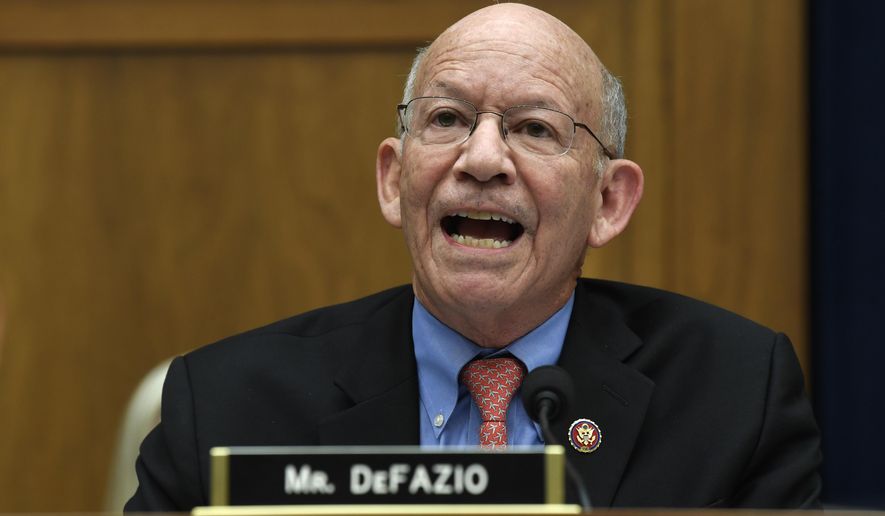Congressional Democrats are working on an infrastructure plan that not only would rebuild America’s highways and bridges but also would undertake a Green New Deal-style transformation of transportation, energy and the entire economy.
“It is going to be green, and it is going to be big,” said House Transportation and Infrastructure Committee Chairman Peter DeFazio, Oregon Democrat.
Although the final plan is unlikely to make it through Congress before the fall, its price tag would extend upward of $2 trillion. Most of the spending would go toward upgrading the nation’s roads, bridges and public transit systems.
The most ambitious portions of the infrastructure package, though, are likely to deal with climate change.
Mr. DeFazio is a champion of a Green New Deal environmental makeover of the U.S. economy. He is expected to use his committee, where the package will originate, to push toward the goal of net-zero carbon emissions by 2050 that was set by President Biden and the Paris Agreement.
The effort faces stiff opposition from Republicans, but Democrats are poised to use special rules to force legislation through the Senate without bipartisan support.
One of the best ways to reach the net-zero goal, Democrats say, is through mandates that tunnels and other projects be built “green-friendly,” with concrete additives that absorb carbon dioxide.
House Democrats from Florida and other vulnerable states are expected to push for rules requiring federally funded infrastructure projects to be weather resistant. Given the recent cold snap that wreaked havoc on Texas’ electric grid, there is potential for bipartisan agreement on that topic.
The plan will include at least $500 million to install electric vehicle charging stations across the country. Expanding the number of electric vehicles on the nation’s roads was a key component of Mr. Biden’s 2020 campaign platform. The final package also will include money to transition the fleet of federal vehicles from gasoline to electric and funding for state and local governments to switch to electric school buses.
Mr. DeFazio also is expected to add funding for an alternative to conventional automobile and airplane travel. It is not clear exactly what shape that alternative will take. In the past, Democrats sought to bolster and expand Amtrak and public commuter rail systems.
In a break from past infrastructure plans, the bill from Mr. DeFazio’s committee likely will not prioritize money for new roads. Environmentalists argue that breaking the nation’s reliance on fossil fuels starts with de-emphasizing the use of automobiles for everyday travel.
The lack of new road construction would be a poison pill, especially for lawmakers from rural districts, a Republican congressman told The Washington Times.
Even without an emphasis on public transit, used mostly in urban and suburban communities that tend to lean Democratic, Republican support for the package may be hard to attain.
Still, Republicans say they are eager to work with the Biden administration on infrastructure regardless of disagreements about what counts as infrastructure.
Republican lawmakers particularly oppose the emphasis on transitioning away from fossil fuels. They argue that abandoning oil and natural gas is unrealistic, given how much of the U.S. economy relies on it.
There is also contention over how to finance the package, which the Biden administration estimates to cost more than $2 trillion.
Mr. Biden proposed raising federal income taxes for the first time since 1993 to pay for the spending.
Mr. DeFazio previously proposed funding infrastructure improvements by increasing the 18.4-cent-per-gallon federal gasoline tax, which also hasn’t been raised since 1993.
Republicans oppose both measures. They argue that raising income taxes would kill any post-pandemic economic recovery and say increasing the gas tax would hit working people the hardest.
The battle over infrastructure likely will be decided in the evenly divided Senate, where Democrats hold the majority thanks to the tiebreaking vote of Vice President Kamala Harris.
An infrastructure overhaul would require at least 10 Republican votes to survive a filibuster, which would be next to impossible with a bill heavy on climate change measures.
The other option for Democrats is to force the package through Congress with a process known as budget reconciliation, which allows a once-a-year spending and revenue package to pass the Senate with a simple majority of 51 votes.
That was the same way Democrats forced through the $1.9 trillion coronavirus relief bill without the support of a single Republican.
Although an infrastructure bill has yet to be introduced in Congress, Democrats are promising to advance one on a strict party-line basis.
Senate Budget Committee Chairman Bernard Sanders said that is likely the only option.
“If Republicans are prepared to support a significant and important piece of legislation that deals with climate change, deals with infrastructure, that’s great,” said Mr. Sanders, a democratic socialist from Vermont. “My own feeling is at this point I doubt that that will be the case.”
• Haris Alic can be reached at halic@washingtontimes.com.




Please read our comment policy before commenting.